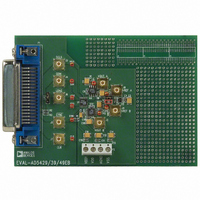EVAL-AD5449EBZ Analog Devices Inc, EVAL-AD5449EBZ Datasheet - Page 21

EVAL-AD5449EBZ
Manufacturer Part Number
EVAL-AD5449EBZ
Description
BOARD EVALUATION FOR AD5449
Manufacturer
Analog Devices Inc
Specifications of EVAL-AD5449EBZ
Number Of Dac's
2
Number Of Bits
12
Outputs And Type
2, Differential
Sampling Rate (per Second)
2.47M
Data Interface
Serial
Settling Time
80ns
Dac Type
Current
Voltage Supply Source
Single
Operating Temperature
-40°C ~ 125°C
Utilized Ic / Part
AD5449
Lead Free Status / RoHS Status
Lead free / RoHS Compliant
SYNC Function
SYNC is an edge-triggered input that acts as a frame synchron-
ization signal and chip enable. Data can be transferred into the
device only while SYNC is low. To start the serial data transfer,
SYNC should be taken low, observing the minimum SYNC
falling edge to SCLK falling edge setup time, t
Daisy-Chain Mode
Daisy-chain mode is the default power-on mode. To disable the
daisy-chain function, write 1001 to the control word. In daisy-
chain mode, the internal gating on SCLK is disabled. SCLK is
continuously applied to the input shift register when SYNC is
low. If more than 16 clock pulses are applied, the data ripples
out of the shift register and appears on the SDO line. This data
is clocked out on the rising edge of SCLK (this is the default; use
the control word to change the active edge) and is valid for the
next device on the falling edge of SCLK (default). By connecting
this line to the SDIN input on the next device in the chain,
a multidevice interface is constructed. For each device in the
system, 16 clock pulses are required. Therefore, the total number
of clock cycles must equal 16 n, where n is the total number of
devices in the chain. See
When the serial transfer to all devices is complete, SYNC should
be taken high. This prevents additional data from being clocked
into the input shift register. A burst clock containing the exact
number of clock cycles can be used, after which SYNC can be
taken high. After the rising edge of SYNC , data is automatically
transferred from the input shift register of each device to the
addressed DAC.
Table 11. DAC Control Bits
C3
0
0
0
0
0
0
0
0
1
1
1
1
1
1
1
1
C2
0
0
0
0
1
1
1
1
0
0
0
0
1
1
1
1
0
1
0
1
1
0
1
C1
0
0
1
1
0
1
0
0
1
Figure 4
1
1
1
0
1
0
1
C0
0
1
0
1
0
0
0
1
0
.
B
A and B
N/A
N/A
N/A
N/A
N/A
DAC
A and B
A
A
A
B
B
A and B
N/A
N/A
4
.
Rev. C | Page 21 of 32
Function Implemented
No operation (power-on default)
Load and update
Initiate readback
Load input register
Load and update
Initiate readback
Load input register
Update DAC outputs
Load input registers
Disable daisy-chain
Clock data to shift register on rising edge
Clear DAC output to zero scale
Clear DAC output to midscale
Control word
Reserved
No operation
When control bits = 0000, the device is in no operation mode.
This may be useful in daisy-chain applications in which the user
does not want to change the settings of a particular DAC in the
chain. Write 0000 to the control bits for that DAC; subsequent
data bits are ignored.
Standalone Mode
After power-on, write 1001 to the control word to disable daisy-
chain mode. The first falling edge of SYNC resets the serial
clock counter to ensure that the correct number of bits are
shifted in and out of the serial shift registers. A SYNC edge
during the 16-bit write cycle causes the device to abort the
current write cycle.
After the falling edge of the 16th SCLK pulse, data is automat-
ically transferred from the input shift register to the DAC. For
another serial transfer to take place, the counter must be reset
by the falling edge of SYNC .
LDAC Function
The LDAC function allows asynchronous and synchronous
updates to the DAC output. The DAC is asynchronously updated
when this signal goes low. Alternatively, if this line is held perma-
nently low, an automatic or synchronous update mode is selected,
whereby the DAC is updated on the 16th clock falling edge when
the device is in standalone mode, or on the rising edge of SYNC
when the device is in daisy-chain mode.
Software LDAC Function
Load-and-update mode can also serve as a software update func-
tion, irrespective of the voltage level on the LDAC pin.
AD5429/AD5439/AD5449




















